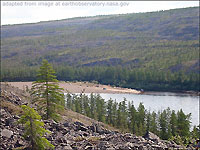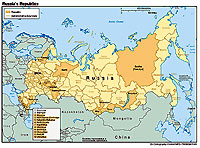Russia to create 'parallel government' in Far East
Anna Arutunyan - Moscow News - themoscownews.com - 4.20.12 - JRL 2012-74
A new state-run development company will get unprecedented powers to invest in natural resources on nearly two thirds of Russia's territory, and be answerable directly to the president, according to a bill drafted by the Economic Ministry this week.

file photoThe State Corporation to develop Eastern Siberia and the Far East will have direct access to land and natural resources in 16 Russian regions (comprising 60 percent of the country), bypassing laws on natural resources, forestry, land distribution and even labor, Kommersant reported Friday, citing a leaked copy of the bill.
In a reflection of the corporation's powers, government sources cited by the paper are already dubbing it "a state within a state," and even a new Far Eastern Republic.

file photo"In essence, a parallel government is being formed that will be headed by [President-elect Vladimir] Putin personally," Rostislav Turovsky, a regions expert and the vice president of the Center of Political Technologies, told The Moscow News. "This will limit the powers of [outgoing President Dmitry] Medvedev as Prime Minister, with Putin taking control of economic decisions when he becomes president. The country will be split into two parts, just like under Ivan the Terrible, with the Zemschina and the Oprichnina. One part will be run by Medvedev, and the other by this state corporation."
The draft of the federal law, suggested in January by then-Emergencies Minister Sergei Shoigu and developed on orders from Putin, was submitted this week to the Energy Ministry, the Natural Resource Ministry, and the Ministry of Trade and Industry.
Putin's press secretary, Dmitry Peskov, could neither confirm nor deny that the bill had been drafted. "No such decision was made," he told The Moscow News. "There are no such plans. This issue is still being developed."
According to Kommersant, the corporation will be granted the right to allot licenses to mine for natural resources such as gold something that is currently only authorized by the federal and regional governments. The entity will be subordinate directly to the president, while other state agencies will not be able to interfere in its decisions, Kommersant writes, citing the bill.
To facilitate the ventures, the body would get 500 billion rubles ($17 billion) worth of stakes in energy, resource and infrastructure companies like RusHydro, Russian Railways, diamond company Alrosa, the Inter RAO energy holding, and the Leninsky Riverboat company. The corporation would also receive unprecedented oversight in the decisions of major state monopolies like Gazprom and Transneft, Kommersant reports.
With its headquarters in Vladivostok, the corporation would get significant tax breaks such as a zero percent profit tax as well as rights to develop projects on lands owned by other entities, something that analysts said could hamper investment by other companies already operating in the area.
Federal funds would subsidize travel and living expenses for Russians and foreigners employed in the corporation's projects. Funding could come from the $90 billion National Well-Being Fund, Vedomosti reported in March.
Putin pledged to revive the Far East and set up a state development corporation as part of his reelection campaign platform. He also named the Far East as one of five key priority areas for the Russian economy in a speech to the Duma earlier this month.
Shoigu was initially fingered as a possible head of the new entity, but in March Putin's deputy, Igor Shuvalov, was named as the likeliest candidate for the job.
"Whoever heads this corporation will control massive resources, and if Shuvalov heads it, he will be at least as powerful as a deputy prime minister, so Shuvalov would be a logical choice," said Turovsky, of the Center of Political Technologies. "Whoever heads this corporation could also be seen as a possible candidate to eventually replace Medvedev as Prime Minister."
President Medvedev will assume Putin's current post as prime minister under a pact the two made public last fall, but speculation is increasing that Medvedev may not hold on to the prime minister's seat for long.
Putin, who will be inaugurated on May 7, will be able to appoint the cooperation's general director and supervisory council, giving him significant leeway in ensuring which investment projects get first choice infrastructural preference.
Analysts argue that because the bill has yet to be submitted to the State Duma, it is too soon to tell whether some of its controversial points will even make it into the final draft. "Much of this could yet raise a lot of debate," Turovsky said. "It could still be a matter of political bargaining."
The bill will open up a slew of investment opportunities to develop billions of dollars worth of natural resource deposits, such as gold deposits in the Sukhoi Log site in the Irkutsk region, iron deposits and undeveloped oil fields in the Krasnoyarsk region, and coal in the Tuva region.
Turovsky added that the move was likely geared to promote the investment opportunities ahead of the Asia-Pacific Economic Cooperation Summit, to be held in Vladivostok in September.
Keywords: Russia, Government, Politics - Russia, Regions - Russia, Far East, Asia - Russian News - Russia
A new state-run development company will get unprecedented powers to invest in natural resources on nearly two thirds of Russia's territory, and be answerable directly to the president, according to a bill drafted by the Economic Ministry this week.

file photoThe State Corporation to develop Eastern Siberia and the Far East will have direct access to land and natural resources in 16 Russian regions (comprising 60 percent of the country), bypassing laws on natural resources, forestry, land distribution and even labor, Kommersant reported Friday, citing a leaked copy of the bill.
In a reflection of the corporation's powers, government sources cited by the paper are already dubbing it "a state within a state," and even a new Far Eastern Republic.
"In essence, a parallel government is being formed that will be headed by [President-elect Vladimir] Putin personally," Rostislav Turovsky, a regions expert and the vice president of the Center of Political Technologies, told The Moscow News. "This will limit the powers of [outgoing President Dmitry] Medvedev as Prime Minister, with Putin taking control of economic decisions when he becomes president. The country will be split into two parts, just like under Ivan the Terrible, with the Zemschina and the Oprichnina. One part will be run by Medvedev, and the other by this state corporation."
The draft of the federal law, suggested in January by then-Emergencies Minister Sergei Shoigu and developed on orders from Putin, was submitted this week to the Energy Ministry, the Natural Resource Ministry, and the Ministry of Trade and Industry.
Putin's press secretary, Dmitry Peskov, could neither confirm nor deny that the bill had been drafted. "No such decision was made," he told The Moscow News. "There are no such plans. This issue is still being developed."
According to Kommersant, the corporation will be granted the right to allot licenses to mine for natural resources such as gold something that is currently only authorized by the federal and regional governments. The entity will be subordinate directly to the president, while other state agencies will not be able to interfere in its decisions, Kommersant writes, citing the bill.
To facilitate the ventures, the body would get 500 billion rubles ($17 billion) worth of stakes in energy, resource and infrastructure companies like RusHydro, Russian Railways, diamond company Alrosa, the Inter RAO energy holding, and the Leninsky Riverboat company. The corporation would also receive unprecedented oversight in the decisions of major state monopolies like Gazprom and Transneft, Kommersant reports.
With its headquarters in Vladivostok, the corporation would get significant tax breaks such as a zero percent profit tax as well as rights to develop projects on lands owned by other entities, something that analysts said could hamper investment by other companies already operating in the area.
Federal funds would subsidize travel and living expenses for Russians and foreigners employed in the corporation's projects. Funding could come from the $90 billion National Well-Being Fund, Vedomosti reported in March.
Putin pledged to revive the Far East and set up a state development corporation as part of his reelection campaign platform. He also named the Far East as one of five key priority areas for the Russian economy in a speech to the Duma earlier this month.
Shoigu was initially fingered as a possible head of the new entity, but in March Putin's deputy, Igor Shuvalov, was named as the likeliest candidate for the job.
"Whoever heads this corporation will control massive resources, and if Shuvalov heads it, he will be at least as powerful as a deputy prime minister, so Shuvalov would be a logical choice," said Turovsky, of the Center of Political Technologies. "Whoever heads this corporation could also be seen as a possible candidate to eventually replace Medvedev as Prime Minister."
President Medvedev will assume Putin's current post as prime minister under a pact the two made public last fall, but speculation is increasing that Medvedev may not hold on to the prime minister's seat for long.
Putin, who will be inaugurated on May 7, will be able to appoint the cooperation's general director and supervisory council, giving him significant leeway in ensuring which investment projects get first choice infrastructural preference.
Analysts argue that because the bill has yet to be submitted to the State Duma, it is too soon to tell whether some of its controversial points will even make it into the final draft. "Much of this could yet raise a lot of debate," Turovsky said. "It could still be a matter of political bargaining."
The bill will open up a slew of investment opportunities to develop billions of dollars worth of natural resource deposits, such as gold deposits in the Sukhoi Log site in the Irkutsk region, iron deposits and undeveloped oil fields in the Krasnoyarsk region, and coal in the Tuva region.
Turovsky added that the move was likely geared to promote the investment opportunities ahead of the Asia-Pacific Economic Cooperation Summit, to be held in Vladivostok in September.